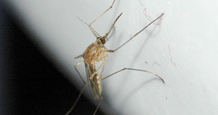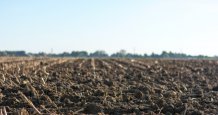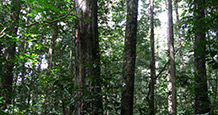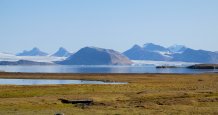News archive 2020

Atlantic circulation collapse could cut British crop farming
Crop production in Britain will fall dramatically if climate change causes the collapse of a vital pattern of ocean currents, new research suggests.

Arctic sea ice can’t ‘bounce back’
Arctic sea ice cannot “quickly bounce back” if climate change causes it to melt, new research suggests.

Nine new staff join Global Systems Institute
A University of Exeter research institute has been boosted by the arrival of nine new staff.

Ocean changes almost starved life of oxygen
Chemical changes in the oceans more than 800 million years ago almost destroyed the oxygen-rich atmosphere that paved the way for complex life on Earth, new research suggests.
.jpg)
Tropical forests’ carbon sink is already rapidly weakening
The ability of the world’s tropical forests to remove carbon from the atmosphere is decreasing, according to a study tracking 300,000 trees over 30 years, published today in Nature.

Scientists explore potential to manipulate genes to control invasive species
Scientists are manipulating genes that could solve environmental sustainability and conservation problems in Australian environments.

Electric cars better for climate in 95% of the world
Fears that electric cars could actually increase carbon emissions are unfounded in almost all parts of the world, new research shows.

Unplanned tree planting could increase global warming and damage the environment, experts warn
No one doubts that trees can help suck carbon dioxide, the main greenhouse gas, out of the atmosphere and help tackle climate change.

‘Uplifting’ project nourishing Amazon people and soil
Thousands of trees have been planted in former rainforest land in the Amazon, nourishing the soil and providing impoverished Brazilians with food and increased incomes.

‘Near-unlivable’ heat for one-third of humans within 50 years if greenhouse gas emissions are not cut
Areas of the planet home to one-third of humans will become as hot as the hottest parts of the Sahara within 50 years, unless greenhouse gas emissions fall, according to research published in the journal Proceedings of the National Academy of Sciences

Look beyond rainforests to protect trees, scientists say
Temperate and tropical dry forests – not just rainforests – are home to thousands of unique tree species, a new study reveals.

Are we underestimating microplastics in the marine environment?
A new study suggests an underestimation of microplastics in the ocean.

COVID-19 crisis causes 17% drop in global carbon emissions
The COVID-19 global lockdown has had an “extreme” effect on daily carbon emissions, but it is unlikely to last – according to a new analysis by an international team of scientists.

Coronavirus is a ‘sliding doors’ moment. What we do now could change Earth’s trajectory
Professor Pierre Friedlingstein, Chair in Mathematical Modelling of Climate Systems at the University of Exeter, contributes to this article for The Conversation

Tropical forests can handle the heat, up to a point
Tropical forests face an uncertain future under climate change, but new research published in Science suggests they can continue to store large amounts of carbon in a warmer world, if countries limit greenhouse gas emissions.

Climate could cause abrupt British vegetation changes
Climate change could cause abrupt shifts in the amount of vegetation growing in parts of Great Britain, new research shows.

Sustainable plastics vital for greener world
Creating sustainable plastics is vital for the future of our environment, a new report says.

Replacing GDP with Gross Ecosystem Product reveals value of nature
Replacing Gross Domestic Product (GDP) with a new “ecosystem” measure reveals the enormous value of the natural world, new research shows.

Story explores complex tale of Colombian forests
The impact of social and political systems on Colombian forests is explored through a short story from a collaboration between Natural Environment Research Council (NERC) and Hay Festival.

Warm springs increase risk of severe summer droughts
Warm and sunny springs – like the one just seen in the UK – can create conditions that pave the way for severe summer droughts, a new study has shown.

Crop pathogens ‘remarkably adaptable’
Pathogens that attack agricultural crops show remarkable adaptability to new climates and new plant hosts, new research shows.

Awards for Exeter climate scientists
Two Exeter climate scientists have received prestigious awards from the Royal Meteorological Society (RMetS).

Exeter researcher in Women’s Engineering Society top 50 list
A University of Exeter researcher has been named as one of the Women’s Engineering Society’s Top 50 Women in Engineering: Sustainability.

‘Gatekeepers’ of biodiversity hotspots facing COVID crisis
Impoverished communities and diverse ecosystems in Colombia are under threat due to the COVID-19 pandemic, researchers say.

Coconut confusion reveals consumer conundrum
Coconut oil production may be more damaging to the environment than palm oil, researchers say.

Palm trees most abundant in tropical forests in the Americas
Palm trees are more than five times more numerous in tropical forests in the Americas than in comparable Asian and African forests, a new study shows.

Plastics found in sea-bed sharks
Microplastics have been found in the guts of sharks that live near the seabed off the UK coast.

New soap opera, comic and apps being used to tackle kidnappings in Mexico
A new soap opera, comic and app are the latest weapons being used to tackle the epidemic of kidnappings in Mexico.

Exeter partnership to pioneer use of data science and AI to solve global environmental challenges
A new initiative designed to find solutions to some of the world’s most pressing environmental challenges has been announced.

Exeter academics elected to British Academy
Two University of Exeter academics have been elected fellows of the British Academy.

Surface clean-up technology won't solve ocean plastic problem
Clean-up devices that collect waste from the ocean surface won't solve the plastic pollution problem, a new study shows.

Small trees offer hope for rainforests
Small trees that grow up in drought conditions could form the basis of more drought-resistant rainforests, new research suggests.

How fish stocks will change in warming seas
New research out today highlights the future effects of climate change on important fish stocks for south-west UK fisheries.

Seafood study finds plastic in all samples
A study of five different seafoods has found traces of plastic in every sample tested.

‘Critical’ questions over disease risks from ocean plastics
Key knowledge gaps exist in our understanding of how ocean microplastics transport bacteria and viruses – and whether this affects the health of humans and animals, researchers say.

Recent global warming trends are inconsistent with very high climate sensitivity
Research published this week in Earth System Dynamics reports that the most sensitive climate models overestimate global warming during the last 50 years.

Glacial lakes 50 per cent bigger since 1990
The amount of water in glacial lakes worldwide has risen by about 50 per cent since 1990, researchers say.

Ocean carbon uptake widely underestimated
The world's oceans soak up more carbon than most scientific models suggest, according to new research.

Pioneering new Joint Centre for Excellence in Environmental Intelligence announce leadership team
The Joint Centre for Excellence in Environmental Intelligence has appointed its inaugural leadership team.

Climate pledges ‘like tackling COVID-19 without social distancing’
Current global pledges to tackle climate change are the equivalent of declaring a pandemic without a plan for social distancing, researchers say.

New research strengthens evidence for climate change increasing risk of wildfires
New scientific publications reviewed since January 2020 strengthen the evidence that climate change increases the frequency and/or severity of fire weather in many regions of the world.

Exeter scientists support council action on low-carbon travel
Climate experts from the University of Exeter have written to Devon County Council in support of action to encourage low-carbon travel.

WWF and Exeter alumni join forces to protect natural habitat
A consortium of Exeter alumni have joined the WWF (World Wide Fund for Nature) and the University of Exeter, in setting up a new PhD project to protect the Cerrado ecosystem in Brazil.

New project to find Europe’s green technology metals
A new four-year project ‘GREENPEG’ has received a grant of €8.3 million from the European Union’s Horizon 2020 research and innovation programme to develop new techniques to explore for pegmatite rocks containing lithium and other green technology metals.

Invitation to submit photos for major climate report
Photographers are invited to submit images for inclusion in a major scientific report on climate change in the UK and around the world.

Warming of 2°C would release billions of tonnes of soil carbon
Global warming of 2°C would lead to about 230 billion tonnes of carbon being released from the world's soil, new research suggests.

Scientists unravel how and why Amazon trees die
A huge new study has unravelled what factors control tree mortality rates in Amazon forests and helps to explain why tree mortality is increasing across the Amazon basin.

Pacific project will build a circular economy to target plastic pollution
Scientists aim to tackle plastic pollution in the Galapagos Islands and wider Eastern Pacific in a major project based on cooperation with local researchers and communities.

University alliance urges G20 leaders to prioritise net zero
A coalition of leading climate research universities is calling on world leaders to prioritise net zero carbon emissions.

Exeter experts recognised as being among world’s most influential scientists
Leading academics from the University of Exeter have been recognised as being amongst the world’s most influential researchers, according to a prestigious new ranking.

Exeter’s pioneering approach to sustainability secures prestigious Guardian award
Pivotal work conducted by staff and students to transform the University of Exeter’s approach to sustainability has won a prestigious Guardian University Award.

Mapping global impacts for all vegetable oils key to sustainability
A lack of data on the environmental and social impacts of vegetable oil crops stands in the way of informed discussions about their relative sustainability, according to a new study by members of the IUCN’s Palm Oil Task Force.

Peatland preservation vital to climate
Preserving the world's peatlands – and the vast carbon stores they contain – is vital to limiting climate change, researchers say.

University of Exeter responds to climate crisis
The University of Exeter has created a comprehensive plan to cut carbon emissions and improve the environment on its campuses and beyond.

COVID lockdown causes record drop in CO2 emissions for 2020
The global COVID-19 lockdowns caused fossil carbon dioxide emissions to decline by an estimated 2.4 billion tonnes in 2020 – a record drop according to researchers at the University of East Anglia (UEA), University of Exeter and the Global Carbon Project.
